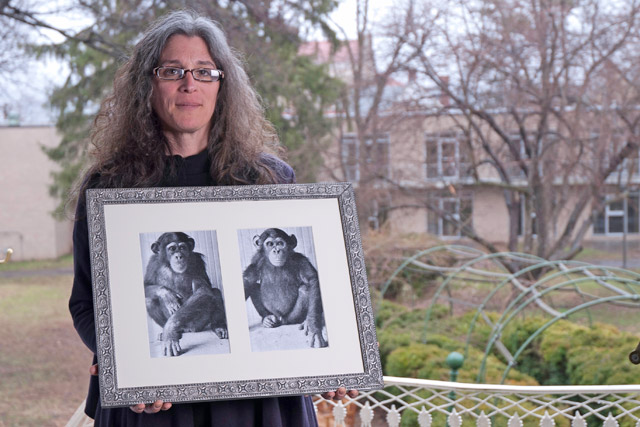Wesleyan To Host Symposium on Great Apes, Ethics, Conservation

A diverse group of primate researchers will convene at Wesleyan on April 22 for a day-long symposium about the relationship between humans and the other great apes – chimpanzees, bonobos, orangutans and gorillas. The schedule is online here.
“Protecting Great Apes: How Science and Ethics Contribute to Conservation” will feature presentations by anthropologists, psychologists, primatologists and conservationists who study or advocate for non-human great apes in the wild and in captivity. Discussions will follow each talk, with an emphasis on chimpanzee behavior and the ethical treatment of non-human great apes.
“We’re in this complicated and increasingly intense relationship with the other great apes,” says Lori Gruen, associate professor of philosophy and the symposium’s principal organizer. “If chimps and other great apes were living in their worlds undisturbed by our activities, we wouldn’t have to raise questions about our relationship to them.”
Gruen is currently teaching a course called “Primate Encounters,” in which students examine the ethical and epistemological implications of humans’ close evolutionary relation to other primates. Her most recent book, Ethics and Animals: An Introduction, was released by Cambridge University Press last month.
“Protecting Great Apes” is the second annual Lauren B. Dachs Chair in Science and Society Symposium. Professor Laura Grabel of Wesleyan’s biology department currently holds the chair. The subject of the first symposium was stem cell research.
This year scholars from Washington University in St. Louis, Duke University and Iowa State University will deliver lectures addressing several aspects of human-ape interaction in the U.S. and Africa, with introductions by scholars from Wesleyan and Yale University.
Researchers and experts from the Wildlife Conservation Society and Chimp Haven, a chimpanzee sanctuary in Louisiana, also will make presentations.
The four lectures at this year’s symposium are:
“Chimpanzee Behavior and Conservation in Senegal: The Human Element,” by Jill Pruetz, an anthropologist at Iowa State University;
“The Research Value of African Sanctuaries: Implications for Understanding Ape Behavior and Conservation,” by Alexandra Rosati, a graduate student in Duke University’s Hominoid Psychology Research Group;
“Conservation and Science – An Essential Relationship for Great Ape Survival,” by Crickette Sanz, an anthropologist at Washington University, and David Morgan, a research fellow at Chicago’s Lincoln Park Zoo and the Wildlife Conservation Society;
and “Providing Sanctuary for Captive Chimpanzees,” by Linda Brent, president and director of Chimp Haven.
The symposium will take place in the Powell Family Cinema at Wesleyan’s Center for Film Studies. Free and open to the public, the symposium opens at 9:30 a.m. Gruen and Grabel will make opening remarks.
Wesleyan’s Animal Studies program and the Ethics in Society Project are co-sponsors of the event.

